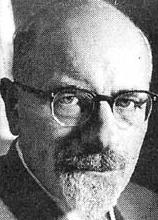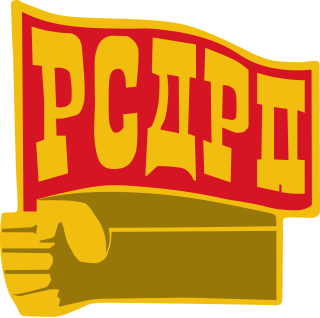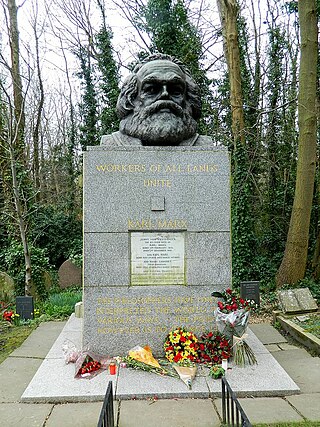Early years
Pearce was born in Weymouth, Dorset on 9 May 1915. His father was an upwardly mobile engineer, his mother a domestic servant of Irish extraction. Brian was their only child, a shy and precocious boy, poor at athletics and not popular among his peers. [1] His father's growing prosperity allowed Brian the freedom to travel. In 1931 he went to Germany and in 1933 to France, where he further developed the language skills he had learned in school. [2]
Although his parents were Tories, Brian's father investigated a few early issues of the Communist Party of Great Britain's organ, The Daily Worker, which Brian read thoroughly. He was also greatly influenced by an uncle who worked as a railwayman and was a partisan of the socialist Independent Labour Party. [2] Brian also read various books and pamphlets he purchased on his own from a radical bookseller on Charing Cross Road.
Brian briefly worked for a company that produced trade journals before going away to University College London in 1934. While a history student there, he joined the Communist Party. [3]
Pearce had been expected to get a first in History and win a scholarship to further pursue his research in the Tudor period, en route to a career in academia, but instead received an upper second on his last exam. His only choice if he was to proceed onto a PhD programme would be to work under the close direction of a supervisor on a topic not of his own choosing. He laboured at that unpleasant task for two years before discovering that another person was almost finished ploughing the same research ground, making award of a PhD unlikely. [4] Pearce henceforth chose a different path.
Career
Pearce married for the first time in 1939 to a party comrade, Lilla Fox. The pair had three children before separating in the late 1940s. [4]
Pearce was drafted into the military early in 1940 and stationed in the north of England. [4] His wartime experiences were uneventful.
After being demobilised, Pearce went to work in the civil service, where he learned Russian. [5] He subsequently left the civil service to work in various Communist Party-related capacities, including as a member of the staff of The Daily Worker, for the Anglo-Soviet Friendship Society, and as a teacher of English at various East European embassies in London. [5]
In 1953, Pearce joined a delegation of the British-Soviet Friendship Society and travelled to the Soviet Union. [5] He was also a member of the Communist Party Historians Group, which conducted serious historical research into various questions of the British labour movement.
Pearce's world was rocked by the so-called Secret Speech delivered by Soviet leader Nikita Khrushchev in 1956. [5] The revelations about the violent and criminal behaviour of Joseph Stalin's regime divided the CPGB between those who favoured becoming truly independent and thoroughly democratised and others who disregarded Khrushchev's revelations as hysterical and overblown and having no real relation to the situation facing the Communist Party in the UK. [5] Pearce began contributing to an opposition journal, The Reasoner, which was terminated just as the Soviet invasion of Hungary took place. This event created an even wider fissure in the British Communist Party, ending in September 1957 with Pearce's expulsion from the CPGB. [5]
After being expelled from the Communist Party, Pearce turned to Trotskyism as a member of the Socialist Labour League, a membership he retained for many years.
Pearce became a professional translator to make ends meet. He was skilled at his craft, combining accuracy with a highly readable style, and was a three-time winner of the Scott Moncrieff Prize for his work.

The Bolsheviks, also known in English as the Bolshevists, were a far-left, revolutionary Marxist faction founded by Vladimir Lenin that split with the Mensheviks from the Marxist Russian Social Democratic Labour Party (RSDLP), a revolutionary socialist political party formed in 1898, at its Second Party Congress in 1903.

Lev Davidovich Bronstein, better known as Leon Trotsky, was a Russian revolutionary, political theorist and Soviet politician. Ideologically a Marxist, his developments to the ideology are called Trotskyism.

Leninism is a political ideology developed by Russian Marxist revolutionary Vladimir Lenin that proposes the establishment of the dictatorship of the proletariat led by a revolutionary vanguard party as the political prelude to the establishment of communism. The function of the Leninist vanguard party is to provide the working classes with the political consciousness and revolutionary leadership necessary to depose capitalism in the Russian Empire (1721–1917).

Trotskyism is the political ideology and branch of Marxism developed by Russian revolutionary Leon Trotsky and some other members of the Left Opposition and Fourth International. Trotsky described himself as an orthodox Marxist, a revolutionary Marxist, and Bolshevik–Leninist, a follower of Marx, Engels, and 3L: Vladimir Lenin, Karl Liebknecht, and Rosa Luxemburg. He supported founding a vanguard party of the proletariat, proletarian internationalism, and a dictatorship of the proletariat based on working-class self-emancipation and mass democracy. Trotskyists are critical of Stalinism as they oppose Joseph Stalin's theory of socialism in one country in favour of Trotsky's theory of permanent revolution. Trotskyists criticize the bureaucracy and anti-democratic current developed in the Soviet Union under Stalin.

Isaac Deutscher was a Polish Marxist writer, journalist and political activist who moved to the United Kingdom before the outbreak of World War II. He is best known as a biographer of Leon Trotsky and Joseph Stalin and as a commentator on Soviet affairs. His three-volume biography of Trotsky was highly influential among the British New Left in the 1960s and 1970s.

Nadezhda Konstantinovna Krupskaya was a Russian revolutionary and the wife of Vladimir Lenin.

Alfred Rosmer was an American-born French Communist political activist and historian who was a leading member of the Comintern. Rosmer is best remembered as a political associate of Leon Trotsky and a memoirist.

Yemelyan Mikhailovich Yaroslavsky was a Bolshevik revolutionary, Communist Party functionary, journalist and historian.

Marxism is a method of socioeconomic analysis that originates in the works of 19th century German philosophers Karl Marx and Friedrich Engels. Marxism analyzes and critiques the development of class society and especially of capitalism as well as the role of class struggles in systemic, economic, social and political change. It frames capitalism through a paradigm of exploitation and analyzes class relations and social conflict using a materialist interpretation of historical development – materialist in the sense that the politics and ideas of an epoch are determined by the way in which material production is carried on.

Karl Berngardovich Radek was a Russian revolutionary and a Marxist active in the Polish and German social democratic movements before World War I and a Communist International leader in the Soviet Union after the Russian Revolution.

Lev Borisovich Kamenev was a Bolshevik revolutionary and a prominent Soviet politician.

Julius Martov or L. Martov was a politician and revolutionary who became the leader of the Mensheviks in early 20th-century Russia. He was arguably the closest friend Vladimir Lenin ever had, and was a friend and mentor of Leon Trotsky, who described him as the "Hamlet of Democratic Socialism".
Revolutionary socialism is a political philosophy, doctrine, and tradition within socialism that stresses the idea that a social revolution is necessary to bring about structural changes in society. More specifically, it is the view that revolution is a necessary precondition for transitioning from a capitalist to a socialist mode of production. Revolution is not necessarily defined as a violent insurrection; it is defined as a seizure of political power by mass movements of the working class so that the state is directly controlled or abolished by the working class as opposed to the capitalist class and its interests.

The Russian Social Democratic Labour Party, also known as the Russian Social Democratic Workers' Party or the Russian Social Democratic Party, was a socialist political party founded in 1898 in Minsk.
Anti-revisionism is a position within Marxism–Leninism which emerged in the 1950s in opposition to the reforms of Soviet leader Nikita Khrushchev. Where Khrushchev pursued an interpretation that differed from his predecessor Joseph Stalin, the anti-revisionists within the international communist movement remained dedicated to Stalin's ideological legacy and criticized the Soviet Union under Khrushchev and his successors as state capitalist and social imperialist.

The anti-Stalinist left is a term that refers to various kinds of Marxist political movements that opposed Joseph Stalin, Stalinism, Neo-Stalinism and the system of governance that Stalin implemented as leader of the Soviet Union between 1924 and 1953. This term also refers to the high ranking political figures and governmental programs that opposed Joseph Stalin and his form of communism, such as Leon Trotsky and other traditional Marxists within the Left Opposition.

Terrorism and Communism: A Reply to Karl Kautsky is a book by Soviet Communist Party leader Leon Trotsky. First published in German in August 1920, the short book was written against a criticism of the Russian Revolution, Dictatorship of the Proletariat, published the previous year in Vienna, Austria by prominent Marxist Karl Kautsky.

Far-left politics in the United Kingdom have existed since at least the 1840s, with the formation of various organisations following ideologies such as Marxism, revolutionary socialism, communism, anarchism and syndicalism.

Foundations of Leninism was a 1924 collection made by Joseph Stalin that consisted of nine lectures he delivered at Sverdlov University that year. It was published by the Soviet newspaper, Pravda.
















